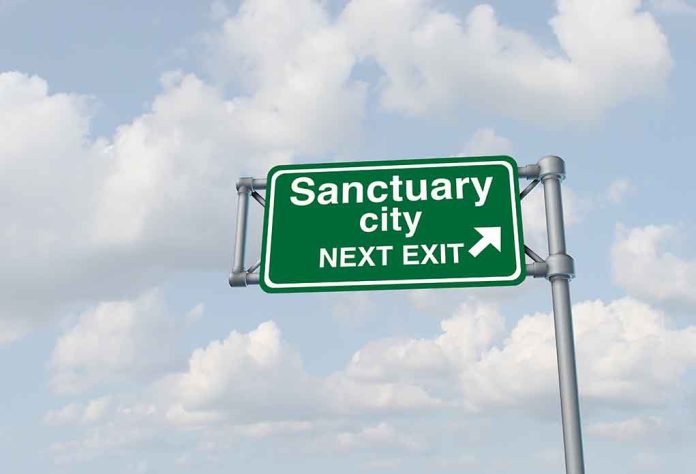
Rep. Harriet Hageman introduces groundbreaking legislation to strip sanctuary cities of student visa privileges, forcing liberal strongholds to comply with federal immigration law or face significant economic consequences.
Key Takeaways
- The “No Student Visas for Sanctuary Cities Act” would block educational institutions in sanctuary jurisdictions from issuing foreign student visas
- The bill targets cities that refuse to comply with ICE detainers and federal immigration enforcement
- Rep. Hageman sent a letter to President Trump on May 7, 2025, supporting his executive order on immigration enforcement
- Key Republican co-sponsors include Reps. Brandon Gill (R-TX), Paul Gosar (R-AZ), and Troy Nehls (R-TX)
- The legislation aligns with President Trump’s April 28 executive order, “Protecting American Communities from Criminal Aliens.”
Taking Action Against Sanctuary Cities
Wyoming Republican Representative Harriet Hageman has introduced bold new legislation aimed at curbing sanctuary jurisdictions’ defiance of federal immigration laws across America. The “No Student Visas for Sanctuary Cities Act” proposes a straightforward approach to bringing these non-compliant cities in line with federal immigration enforcement by hitting them where it hurts—their profitable foreign student programs. The bill would amend the Immigration and Nationality Act to prohibit educational institutions in sanctuary jurisdictions from issuing student visas, creating a powerful financial incentive for compliance with federal law.
The legislation specifically targets jurisdictions that refuse to honor ICE detainers – the formal requests issued by Immigration and Customs Enforcement to local law enforcement agencies to hold potentially deportable individuals for up to 48 hours. Sanctuary cities have long ignored these detainers, releasing criminal illegal immigrants back into communities rather than cooperating with federal authorities. Hageman’s bill represents one of the strongest legislative attempts to date to force these jurisdictions to abandon their sanctuary policies or face substantial economic consequences in their education sectors.
Supporting President Trump’s Immigration Agenda
On May 7, 2025, Rep. Hageman sent a letter to President Trump regarding the proposed legislation, expressing strong support for his administration’s renewed focus on immigration enforcement. The timing of the bill is strategic, coming shortly after Trump’s April 28 executive order titled “Protecting American Communities from Criminal Aliens.” This alignment demonstrates a coordinated approach between the legislative and executive branches to address the ongoing immigration crisis, with particular focus on jurisdictions that deliberately obstruct federal enforcement efforts.
The bill has gained immediate support from key Republican representatives, with Reps. Brandon Gill (R-TX), Paul Gosar (R-AZ), and Troy Nehls (R-TX) are signing on as co-sponsors. Their backing signals growing momentum for tougher measures against sanctuary jurisdictions that have persistently undermined federal immigration authorities. The legislation represents a shift toward using economic leverage rather than direct federal intervention to achieve compliance, potentially sidestepping the legal challenges that have plagued previous attempts to penalize sanctuary cities.
America First Immigration Policy
In her communications about the bill, Hageman has been outspoken about what she describes as government actions that favor “elites over average Americans” – a sentiment that resonates strongly with conservative voters frustrated by the perceived double standards in immigration enforcement. Her criticism extends to fellow Wyoming politician and former Representative Liz Cheney, whom Hageman labeled a “globalist” in contrast to her America-first approach to immigration policy. The characterization highlights the ongoing ideological battle within the Republican party between establishment figures and those aligned with President Trump’s policy priorities.
The “No Student Visas for Sanctuary Cities Act” represents a significant escalation in the federal government’s approach to sanctuary jurisdictions. By targeting the lucrative foreign student market, estimated to contribute billions to the U.S. economy annually, the bill creates meaningful consequences for cities and states that have previously faced few repercussions for their non-compliance with federal immigration laws. If passed, educational institutions in these areas would face a difficult choice between their sanctuary policies and their ability to attract international students, potentially forcing a reconsideration of long-standing sanctuary protections.
Changing the Enforcement Landscape
The introduction of this legislation marks a significant shift in strategy for immigration enforcement under President Trump’s second term. Rather than relying solely on direct federal enforcement actions, which have often been blocked by activist judges, this approach leverages existing federal authority over immigration to create compliance incentives. By focusing on student visas specifically, the bill targets an area where the federal government maintains clear constitutional authority, potentially making it more resistant to legal challenges that have derailed previous attempts to rein in sanctuary jurisdictions.
As the bill moves through the legislative process, it is likely to face strong opposition from Democrats and advocacy groups supporting sanctuary policies. However, with Republican support in Congress and backing from the President, the “No Student Visas for Sanctuary Cities Act” represents one of the most concrete legislative efforts to date to address the longstanding issue of sanctuary jurisdictions and their impact on immigration enforcement. The outcome of this legislative push could significantly reshape the relationship between federal immigration authorities and local governments across the country.



